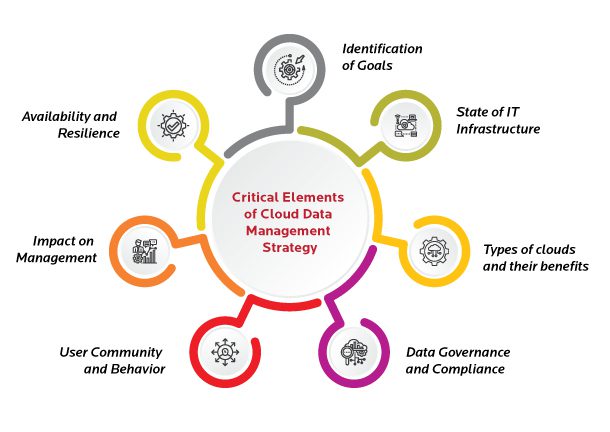As much as data is important for any company to sustain in the increasingly competitive business landscape, it is equally complicated to manage. As per Statista, the world will produce close to 180 zettabytes of data in the next two years. In what is turning into a data-centric economy, organizations need to unleash the potential of their data to accurately navigate and make informed predictions.
Given the significance and urgency of efficient data processing and storage, cloud data management has come to the fore as a necessity. It gives businesses and data owners a versatile ecosystem to leverage their data for success.
In this blog post, we learn what cloud data management is and it benefits your organization.
What is cloud data management?

Cloud data management is the process of storing, processing, securing, and managing your business data across cloud platforms. It is typically an offsite data center that is managed by cloud service providers like AWS, Google, and Azure. The appeal of managing your data on cloud platforms includes automated backups, vendor support, and seamless data access
1. Advantages of cloud data management
Cloud data management, as a cultural change within your organization, can help you address a range of issues in terms of operations, profitability, and sustainability. Below are some of the advantages of leveraging cloud data management.
2. Increased security
By migrating to a cloud ecosystem and leveraging cloud data management, you can implement enhanced security practices. With cloud data management, there is an additional layer of security by centralizing data and ensuring that only authorized users have access. It also allows for better monitoring of data access, further securing the data. Finally, it enables quick deployment of security patches and updates to protect against potential threats.
3. Improved scalability
With cloud data management, you can add more storage to your servers hosted on cloud platforms as and when the need arises. Some organizations free up the extra memory once their workload reduces to optimize cost. With on-premise servers, however, you won’t have that facility.
4. Cost efficiency
With cloud platforms, you can only pay for what you use. This contrasts physical servers, where you will be charged for the bare storage space you purchase or rent regardless of its utilization. Cloud platforms provide a variety of pricing programs that you can leverage to keep your cloud usage in check.
5. Synchronization
Cloud data management enables you to synchronize your data and make it accessible to your entire team across devices. Since your data isn’t tied up to a single machine, you can have better collaboration by keeping everyone up-to-date when working on projects like mobile apps. It also allows you to track the changes made to data in real-time.
6. Improved data quality
You can streamline the implementation of your data governance policy by eliminating the silos between teams. Cloud computing allows you to establish a single source of truth for the data, which ensures that it is consistent, updated, and democratized.
7. Disaster recovery
Once you migrate your data to a cloud platform, it gives you the freedom to focus on your core business functions without worrying about data protection since there will be a proper disaster recovery plan in place. With your data being backed-up at regular intervals, you can execute your disaster recovery strategies immediately during emergencies. More importantly, it will help you avoid unpleasant instances of cyberattacks.
Conclusion
Cloud data management is fast becoming a norm more than a trend. Organizations are choosing to move away from outdated practices of managing data on locally hosted storage systems. Migrating to the cloud facilitates flexibility, versatility, better security, and newer technological capabilities as you usher your business into a new era of cloud computing.
Prismberry is an end-to-end cloud solutions provider that helps businesses leverage the power of the cloud to streamline operations and reduce costs. Our services include cloud migration, cloud security, and cloud optimization.



